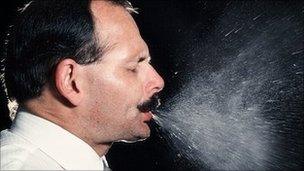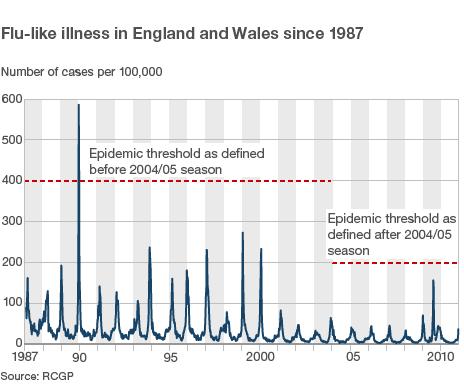Analysis: How bad is this year's flu outbreak?
- Published

This winter's flu outbreak could be the worst for a decade
Everyone likes a black and white answer. But the problem with this year's flu season is that there isn't one.
Flu is dominating the headlines. But no-one is certain about how worried they should be.
A quick glance at official data does not help. The numbers going to their GPs with flu - a good indication of how much is circulating - suggest this winter could be the worst for a decade.
The rates are higher than they have been since the last really bad winter in 1999-2000. During the swine flu pandemic the peak was higher, but that happened in the summer.
On top of this, the UK - or rather England as the other nations seem to be escaping the worst of it - has also been hit harder than much of the rest of Europe.
But what really marks this out is the people it is affecting and how ill it is making them - and this is why the current outbreak is difficult to categorise.

This flu, which is dominated by the swine flu strain, has been dubbed a Jekyll and Hyde virus.
That is because for most it is a mild illness which they will quickly recover from. However, for a minority it is more serious - as the latest data illustrates.
Hospital
The numbers ending up in hospital are high - over Christmas a fifth of England's critical care beds were taken up by flu patients.
What is more, it is hitting the young hardest. Previous flu seasons affected the elderly the most. But this changed with swine flu which seemed to go after younger age groups. A quick glance at the critical care figures show that nearly 90% of patients are under 65.
Scientists believe this is because pensioners have some immunity because of exposure to a very similar strain years ago.
As a result, there has been a flurry of media stories about ill babies and dying teenagers.
But that should not mask the fact that deaths are still likely to be very low when compared to previous large outbreaks. Last year nearly 500 people died during the pandemic. This year the figure currently stands at 39.
During the 1999-2000 winter, excess deaths were estimated to have hit 20,000. Even during the mild winters over the following nine years deaths ran into several thousand a year.
This was because it was the elderly who were being affected and because of their more frail condition they were more likely to succumb, even to mild infections.
This year has been further complicated by the scare over vaccine shortages. While overall there is no national shortage, some areas have run out of the jab.
This is unheard of. GPs are usually struggling to get people to come forward at all. It seems likely this is a consequence of the high-profile coverage the outbreak has attracted.
It has, in a way, become a vicious cycle. The more we worry, the more there is to worry about.